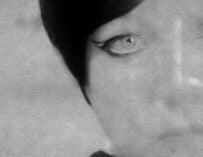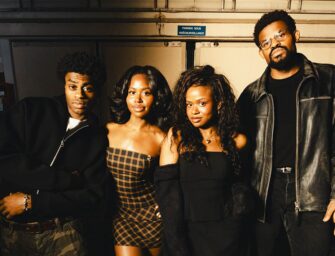
The Last Internationale: “This is a song for the underdog who will one day get her revenge.”
These NYC rockers haven’t had it easy over the last few years, but they’ve incorporated that struggle into their music
We all know by now that it’s not a case of “when you’ve made it, you’ve made it.” For every Coldplay and U2, there are hundreds of artists for which a career in music is very much a topsy-turvy affair, as bluesy NYC rockers The Last Internationale know only too well. After their critically successful debut album, 2014’s We Will Reign, they’d be forgiven for thinking that it would be plain sailing from then on. But fast-forward a few years, during which they’d been dropped by their label Epic and evicted from their home, Delila Paz and Edgey Pires have had to dig deep and muster all their strength just to keep going as a band. We can be very hugely thankful that they did, as anyone who heard 2019’s Soul On Fire can testify. Aided by executive producer Tom Morello, it’s a record which is both raw and intricate, technically proficient whilst still poignant.
Here, Paz and Pires talk us through the album’s title track…
Inspiration
Nina Simone said, ‘There’s no excuse for the young people not knowing who the heroes and heroines are or were.’ This song is a homage to some of those heroes that inspired us and paved the way for bands like ours; Nina Simone, Gil Scott-Heron, Victor Jara, Janis Joplin, Mahalia Jackson, Big Mama Thornton, Robert Johnson, Woody Guthrie, Pete Seeger, Sam Cooke, Paul Robeson, Buffy Sainte-Marie, John Coltrane, and the many many other artists that either witnessed or experienced great injustices and courageously raised their voices for their people no matter the consequences or threats on their lives.
Their legacies and the examples they set with their words, music, and actions as well as their flaws are exactly what sets the bar on what a musician today can achieve in terms of songwriting and artistic integrity.
On a personal level, the emotion and suffering in their songs gave us the will to continue not just in our career, but in life in general. The apparent simplicity and underlying depth and complexities in their words and grooves kept our ears glued to the turntable as we replayed the same song over and over for hours at a time as we tried to discern what the hell was going on. Music doesn’t sound like this today with all the auto-tune, loops, polished productions, and snapping everything to a grid.
With Soul On Fire, we were going through the worst time in our career. We were living in LA, almost everyone who called us “family” had abandoned us, and we were dropped from our label, we were blacklisted by some of the most powerful people in the industry, and we had nowhere to live and no money. We felt defeated, with no future and nowhere to turn. We didn’t know it then, but it was a huge blessing because our songwriting had dramatically improved. We had no more of the distractions or interferences from the label. We were desperate and stopped caring about singles, the charts, or what the label wanted to hear. We channelled all of our angst and frustrations into our songs.
This process also made us grateful for what we did have, rather than focusing on what we had lost. We had the most incredible people in our corner, like Tom Morello, Rod Macsween, and a few others. Ultimately, it was our fans that really kept us going. Our feelings of helplessness turned into extreme confidence that we can do and achieve anything. Fuck the labels, we can do it all ourselves.
We were also grateful for our health and the ability to use our music to uplift humanity. Unlike Pete Seeger or Victor Jara, we didn’t have to face congressional committees or the tanks. At least, not yet.
Soul On Fire transmits all the emotions we were feeling at the time. Although the song was written from a position of defeat, it is ultimately an inspirational song meant to empower and unite people in a polarized world. This is a song for the underdog who will one day get her revenge.

The Last Internationale: “We decided to write the second verse using titles from other classic albums.”
Lyrics
The chorus was the first thing written. The first verse followed:
“Some are born to kill
Others are born to run
Some need to keep on takin’
Till you ain’t got none”
We thought that set the song up for what else we’d want to say. By the time we got to the second verse, we were a little stumped. We didn’t know how to follow up to the first. We noticed that “born to run,” in the second line of the first verse, is the title of a Bruce Springsteen album. That was unintentional. So then we decided to write the second verse using titles from other classic albums:
“Lately I’ve been feelin’ Kind Of Blue
Way down in the Jungle Groove
Paranoid, All Eyez On Me
Rumours circle, vultures feed”
We wanted to challenge ourselves. But it made the entire verse easier to write, as it took probably less than 5 minutes. But it took hours to come up with the album title exercise idea!
For the breakdown, we simply felt like listing artists that inspired us. We envisioned ourselves as those artists. There is a piece of all those great artists from the past that become part of your DNA. We want the listener to see themselves as continuing the same struggles and traditions that they were a part of.

The Last Internationale: “Like our first record, each song was cut in just one or two takes.”
In the Studio
We had one more major obstacle ahead of us, who would play drums? We recorded our debut album when Brad Wilk was in the band. We had both improved as musicians since recording that album, so we needed to make sure to bring someone in who shared our vision and can groove and bring the same intensity as Brad. The person for the job was Joey Castillo. He was drumming for Scott Weiland when we opened for him on tour. We hit it off with Joey right away and thought he was one of the grooviest and most ferocious rock drummers we’ve ever heard. Joey, who used to play with Queens Of The Stone Age, and Brad are equally great and we just knew it would be a perfect fit. Like our first record, each song was cut in just one or two takes. The simplicity and underlying complexities of the grooves on our favourite records could be heard on Soul On Fire. What an amazing feeling that is.
We brought in an engineer from Portugal named Joao Brandao; the drums were tracked in LA and the overdubs and most of the vocals in Portugal. He understood that we wanted this record to be really raw. No polishing anything. He was instrumental in the gnarly guitar and bass tones you hear on Soul On Fire and throughout the album. With mainstream rock playing it safe and turning more towards commercial sponsors, we were unsure of how this record would be received. In the end, we said, ‘Fuck it, make it sound the least mainstream as possible.’ Luckily, our base has received it well and it is attracting many more new people.
For vocals, the idea was to sing the songs once like it’s a live show. Delila didn’t want to sing each line at a time and then comp the best vocal takes. We wanted to keep the feeling of a one-take performance from beginning to end.
The final battle was mixing. We’ve tried maybe a dozen engineers, but none of them quite got it right. In fact, we always preferred the rough mixes. By this time we’ve exhausted all of our budget and had to turn to crowd-funding to finish the record. We put the album up for pre-sale and the fans really came through. We hit around 300 percent of our target on Pledge Music, which we will never see because the company stole our money and product, but that is another story. However, we did manage to get a percentage out at the beginning of the campaign to help pay for some of the mixing expenses.
We then contacted Vance Powell about mixing our album. He did some of our favourite modern records and we knew he’d nail it. He agreed to do it. So we got on a plane to Nashville and sat in the studio with him as he mixed each song in under three hours. The album was finally mixed!
Soul On Fire is out now and The Last Internationale will soon be heading out on tour across Europe and the UK. For dates and ticket info, head to tlinyc.com







![Interview: Jessie Jo Dillon [2025]](https://www.songwritingmagazine.co.uk/wp-content/uploads/jessie-jo-dillon-2-by-libby-danforth-335x256.jpg)

























Related Articles